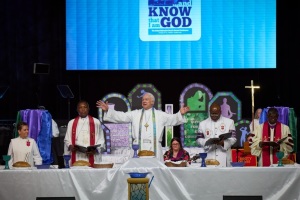Einstein's Manuscripts Digitized and Made Public
Research Notes, Love Letters, and Fan Mail to Be Digitized for Internet Display
Those who didn't study physics beyond high school may know little more of Albert Einstein than his unique hairstyle and his theory of relativity equation, E = MC2. But thanks to the Hebrew University of Jerusalem, and a grant from the Polonsky Foundation U.K., the general public will have a much greater opportunity to learn about Einstein than ever before.
The academic and research notebooks, as well as the love letters, fan mail, and personal notes of the Jewish-German physicist are being digitized and put on the Internet, The Associated Press reports.
Einstein left his papers and personal correspondences, totaling 80,000 documents, to the Hebrew University upon his death. The university has been keeping the documents and notebooks in a climate-controlled safe ever since, with currently only about 900 of Einstein's documents available online for the public.
The university seems pleased to be able to digitize, restore, and share the physicist's work.
"Knowledge is not about hiding. It's about openness," The president of the Hebrew University, Menachem Ben Sasson, told The Associate Press.
Working with the Hebrew University are both Princeton University and the California Institute of Technology. These two American universities are working to annotate Einstein's research notes and papers.
The documents being made public are not merely of a scientific nature, but include everything from love letters, to ideas on solving foreign conflict.
For example, the collection includes a letter Einstein wrote to an Arab newspaper in which he suggests a counsel of Jewish and Arab leaders in various field meet to discuss conflict solutions.
The Hebrew University says it is making these documents public because they want to provide a more complete knowledge of who Albert Einstein really was.
"More than anyone else, [Einstein] expressed his views on every agenda of mankind. Now we have a complete and full picture of that person," Hanoch Gutfreund, former president of Hebrew University told The Associated Press.





























